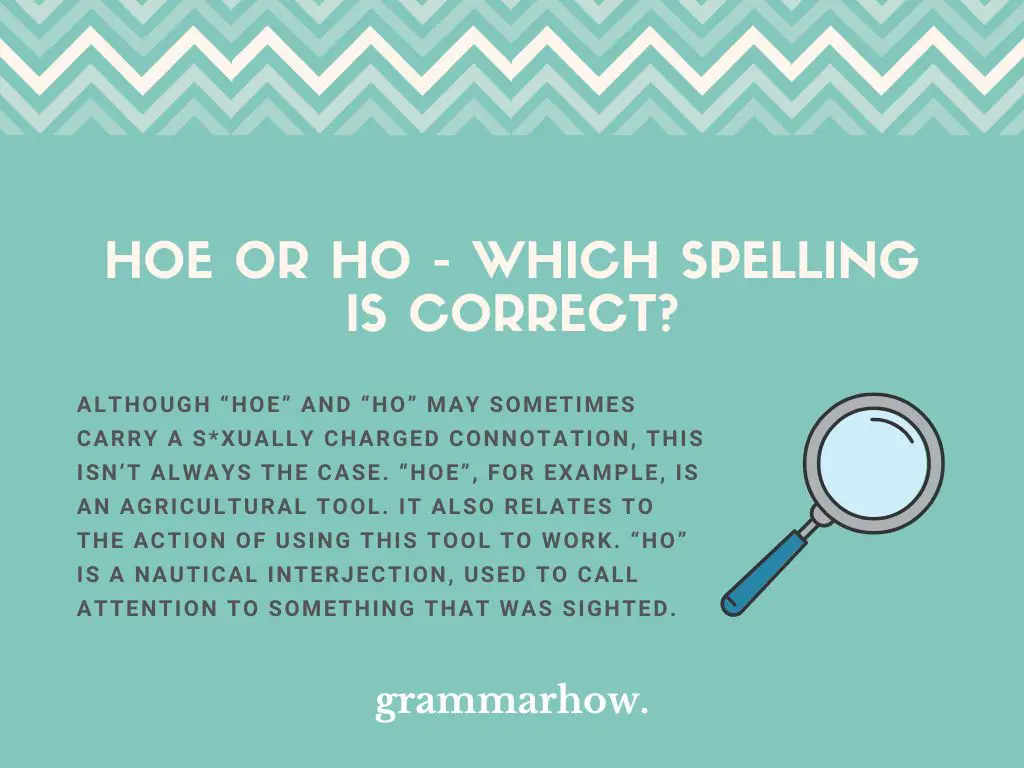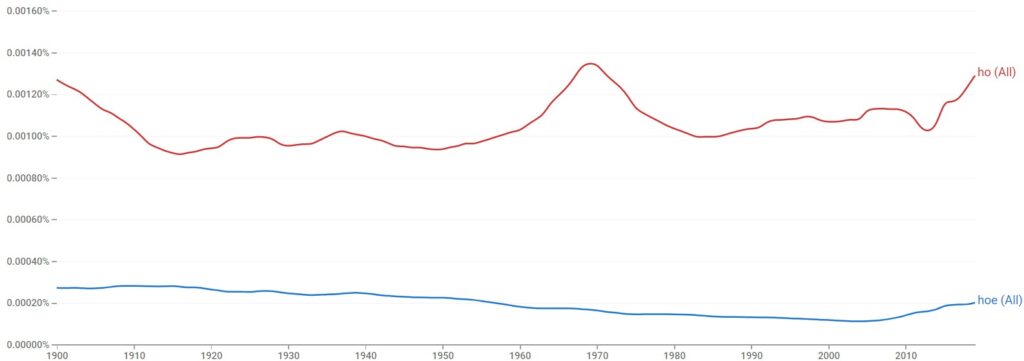“Hoe” and “Ho” are words that have both an appropriate and an inappropriate meaning. To communicate well, it’s important to know both, in order to make the right choices and avoid embarrassing, unintended mistakes.
Let’s dig a little deeper here, and see how we can correctly use those words.
Hoe or Ho – Which Spelling Is Correct?
Although “Hoe” and “Ho” may sometimes carry a s*xually charged connotation, this isn’t always the case. “Hoe”, for example, is an agricultural tool. It also relates to the action of using this tool to work. “Ho” is a nautical interjection, used to call attention to something that was sighted.

Let’s take a look at some examples:
- The farmer hoed the land in preparation for planting.
- The man called Sam a h*e for no apparent reason. (inappropriate)
- We heard the captain say “ho!” and when we looked, there was a beautiful whale.
- We heard the crowd screaming “h*!” and it was quite upsetting (inappropriate)
We prepared two sets of examples. In the first set we have two sentences using “Hoe”, one correctly and the other one inappropriately (even if grammatically correct).
The same goes for the second set of examples, where both sentences have the word “Ho”. The first sentence is correct and acceptable, while the second one isn’t.
Hoe
As a slang, “Hoe” is currently known for its s*xually charged meaning. We consider it offensive and inappropriate. However, “Hoe” is also an agricultural or garden tool, used to work the land.
“Hoe” can work as a noun, in relation to the actual tool, or as a verb, as the action to work with said tool. The Cambridge Dictionary describes a “Hoe” as a garden tool that has a short blade and is used to break the ground and remove weed.
Let’s look at some examples of how to correctly use the word “Hoe”:
- Is there a hoe in the toolshed?
- You’re going to need the hoe to break up the soil.
- He took the hoe and headed towards the garden.
- I’m hoeing the ground to keep down the weeds.
- We have a long row to hoe, and I’ll wait until the weekend to tackle it.
As you can see from the examples, “Hoe” should be used in relation to the work on the garden or the land, both as a noun and as a verb.
Ho
“Ho” has become known as an alternate spelling for the word “Hoe”, in its s*xual connotation. It’s inappropriate and, in this context, it should be avoided. However, “Ho” is a valid interjection, used to indicate surprise or call someone’s attention.
The Cambridge Dictionary agrees with our definition. “Ho”, as a s*exually charged word is offensive towards women and shouldn’t be used. It is valid, though, as an interjection, as you’ll see by the examples:
- Ho there! It’s such a surprise to see you.
- Ho! Look there, I can see the island.
- Ho-ho-ho! Merry Christmas!
- Ho, a town is visible!
- Ho! We should slow down a little.
As an interjection, “Ho” may sound a little obsolete and you may be thinking that “Hey” does the same job and is more modern.
Obviously, you can use the interjection of your preference. However, the point here is that “Ho” is a valid word with an appropriate meaning that can be incorporated into anyone’s vocabulary.
Which Is Used the Most?
We have no idea which of the two words is used more often, “Hoe” or “Ho”. Which one do you think it is? Let’s look at the graph from Google Ngram Viewer below, and discover.

“Ho” is used much more than “Hoe”, and we’re not sure what to make of it. By the graph, we can’t tell the connotation each word is being used with, meaning that we can’t be sure it’s counting only the appropriate use of those word.
Either way, the graph doesn’t lie, right? “Ho” is used more often than “Hoe”, and that’s been the case all along.
Final Thoughts
“Hoe” and “Ho” are often charged words, that carry a demeaning s*xual connotation. However, they’re valid words that can be used with very appropriate meanings. “Hoe” is a garden tool, while “Ho” is a common interjection to call people’s attention or show surprise.

Martin holds a Master’s degree in Finance and International Business. He has six years of experience in professional communication with clients, executives, and colleagues. Furthermore, he has teaching experience from Aarhus University. Martin has been featured as an expert in communication and teaching on Forbes and Shopify. Read more about Martin here.
